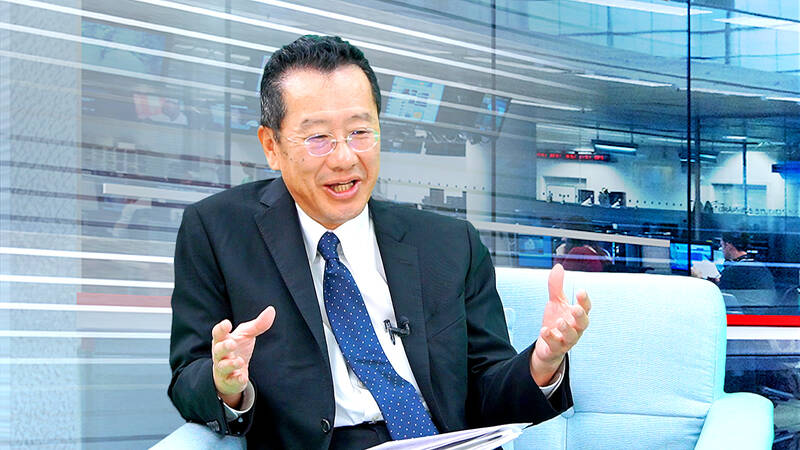Taiwan is reportedly to publish a list of key technologies it wants to protect from China’s reach, Nikkei Asia reported yesterday, citing National Security Council Secretary-General Wellington Koo (顧立雄).
The report comes as the US is rumored to be planning to expand its ban on chip exports to China this month and the EU this week published a list of key technologies crucial to the bloc’s economic security.
“Before the end of the year, the National Science and Technology Council will announce what are considered core technologies that need to be protected,” Nikkei Asia quoted Koo as saying.

Photo: Chen Yun, Taipei Times
It is expected to cover industries including semiconductors, agriculture, aerospace, and information and communications technology, the report said.
In addition to technology transfers, Taipei would also focus on issues related to investments, personnel and operations in those industries, it added.
“The new policy will elevate critical technology in supply chain and semiconductors to a national security level, enabling closer scrutiny. The aim is to prevent efforts to acquire crucial tech by China, which is targeting upstream IC design in Taiwan,” Koo was quoted as saying.
Taiwan last year enacted amendments to the National Security Act (國家安全法) and the Act Governing Relations Between the People of the Taiwan Area and the Mainland Area (臺灣地區與大陸地區人民關係條例), imposing harsher punishments for economic espionage and technology theft.
The Investment Commission also revised the Regulations for Permission on Investment or Technology Cooperation in the Mainland Area (在大陸地區從事投資或技術合作許可辦法), requiring Taiwanese firms to obtain approval if they plan to sell their local assets, factories or transfer their equities in China to avoid the risk of technology leakage.
Meanwhile, the Ministry of Economic Affairs has pledged to investigate if Taiwanese firms helping Huawei Technologies Co (華為) with chipmaking plants in China have breached US sanctions against the Chinese tech giant, Minister of Economic Affairs Wang Mei-hua (王美花) said on Wednesday.
Wang was responding to a request by Democratic Progressive Party Legislator Lai Jui-lung (賴瑞隆) at a meeting of the legislature’s Economics Committee that followed a Bloomberg News report this week identifying four firms working on chip fabs backed by Huawei in China.
Lai asked for a preliminary report on the probe within a month.
The Central News Agency also cited an unidentified ministry official saying its investment department would look into whether the firms are conducting their businesses in China within the scope of applications approved by Taipei.
The firms include chip material reseller Topco Scientific Co (崇越), clean room equipment supplier L&K Engineering Co (亞翔), construction specialist United Integrated Services Co (漢唐) and chemical supply system provider Cica-Huntek Chemical Technology Taiwan Co (矽科宏晟), Bloomberg News reported.
Wang told lawmakers that the four companies had helped Huawei with “wastewater and environmental protection equipment” for its factories, and not with sensitive technologies that could impact national security.
The Bloomberg report comes after Huawei unveiled a smartphone in late August with an advanced made-in-China chip, spurring alarm in Washington and calls to completely cut off Huawei and its Shanghai-based chipmaker Semiconductor Manufacturing International Corp (中芯).
US Secretary of Commerce Gina Raimondo told a US Senate Commerce Committee hearing on Wednesday that reports of a chip breakthrough by Huawei are “incredibly disturbing” and emphasized that her department needs more ways to enforce its export-control regimen.

Macronix International Co (旺宏), the world’s biggest NOR flash memory supplier, yesterday said it would spend NT$22 billion (US$699.1 million) on capacity expansion this year to increase its production of mid-to-low-density memory chips as the world’s major memorychip suppliers are phasing out the market. The company said its planned capital expenditures are about 11 times higher than the NT$1.8 billion it spent on new facilities and equipment last year. A majority of this year’s outlay would be allocated to step up capacity of multi-level cell (MLC) NAND flash memory chips, which are used in embedded multimedia cards (eMMC), a managed

CULPRITS: Factors that affected the slip included falling global crude oil prices, wait-and-see consumer attitudes due to US tariffs and a different Lunar New Year holiday schedule Taiwan’s retail sales ended a nine-year growth streak last year, slipping 0.2 percent from a year earlier as uncertainty over US tariff policies affected demand for durable goods, data released on Friday by the Ministry of Economic Affairs showed. Last year’s retail sales totaled NT$4.84 trillion (US$153.27 billion), down about NT$9.5 billion, or 0.2 percent, from 2024. Despite the decline, the figure was still the second-highest annual sales total on record. Ministry statistics department deputy head Chen Yu-fang (陳玉芳) said sales of cars, motorcycles and related products, which accounted for 17.4 percent of total retail rales last year, fell NT$68.1 billion, or

In the wake of strong global demand for AI applications, Taiwan’s export-oriented economy accelerated with the composite index of economic indicators flashing the first “red” light in December for one year, indicating the economy is in booming mode, the National Development Council (NDC) said yesterday. Moreover, the index of leading indicators, which gauges the potential state of the economy over the next six months, also moved higher in December amid growing optimism over the outlook, the NDC said. In December, the index of economic indicators rose one point from a month earlier to 38, at the lower end of the “red” light.

MediaTek Inc (聯發科) shares yesterday notched their best two-day rally on record, as investors flock to the Taiwanese chip designer on excitement over its tie-up with Google. The Taipei-listed stock jumped 8.59 percent, capping a two-session surge of 19 percent and closing at a fresh all-time high of NT$1,770. That extended a two-month rally on growing awareness of MediaTek’s work on Google’s tensor processing units (TPUs), which are chips used in artificial intelligence (AI) applications. It also highlights how fund managers faced with single-stock limits on their holding of market titan Taiwan Semiconductor Manufacturing Co (TSMC, 台積電) are diversifying into other AI-related firms.